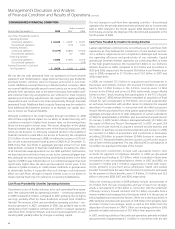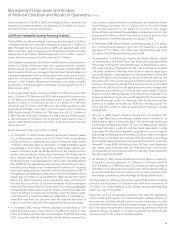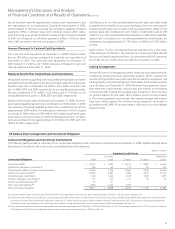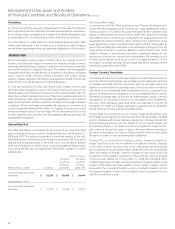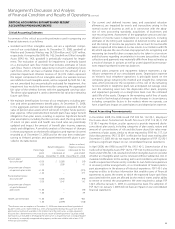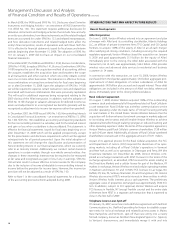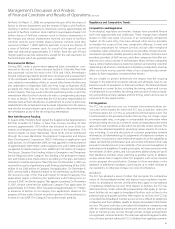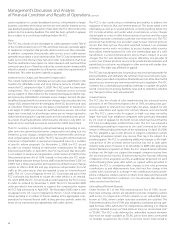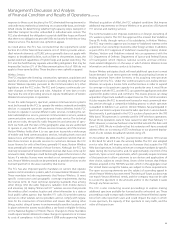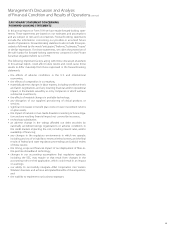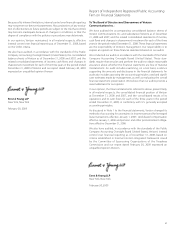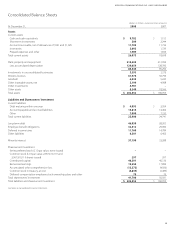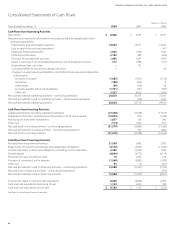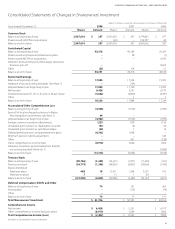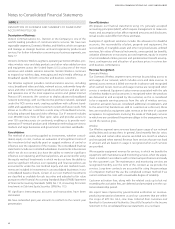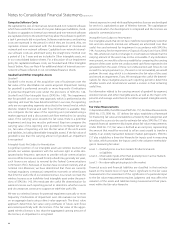Verizon Wireless 2008 Annual Report Download - page 36
Download and view the complete annual report
Please find page 36 of the 2008 Verizon Wireless annual report below. You can navigate through the pages in the report by either clicking on the pages listed below, or by using the keyword search tool below to find specific information within the annual report.State Regulation and Local Approvals
Telephone Operations
State public utility commissions regulate our telephone operations with
respect to certain telecommunications intrastate rates and services and
other matters. Our competitive local exchange carrier and long distance
operations are generally classified as nondominant and lightly regu-
lated the same as other similarly situated carriers. Our incumbent local
exchange operations are generally classified as dominant. These latter
operations predominantly are subject to alternative forms of regulation
(AFORs)inthevariousstates,althoughtheyremainsubjecttorateof
return regulation in a few states. Arizona, Illinois, Nevada, Oregon and
Washington are rate of return regulated with various levels of pricing
flexibility for competitive services. California, Connecticut, Delaware, the
District of Columbia, Florida, Indiana, Maryland, Michigan, Massachusetts,
NewJersey,NewYork,NorthCarolina,Ohio,Pennsylvania,RhodeIsland,
South Carolina, Texas, Virginia, West Virginia and Wisconsin are under
AFORswithvariouslevelsofpricingflexibility,detariffing,andservice
qualitystandards.NoneoftheAFORsincludeearningsregulation.In
Idaho, Verizon has made the election under a statutory amendment into
a deregulatory regime that phases out all price regulation.
Video
Companies that provide cable service over a cable system are typically
subject to state and/or local cable television rules and regulations. As
noted above, cable operators generally must obtain a local cable fran-
chise from each local unit of government prior to providing cable service
in that local area. Some states have recently enacted legislation that
enables cable operators to apply for, and obtain, a single cable franchise
at the state, rather than local, level. To date, Verizon has applied for and
received state-issued franchises in California, Indiana, Florida, New Jersey,
Texas and the unincorporated areas of Delaware. We also have obtained
authorizationfromthestatecommissioninRhodeIslandtoprovidecable
service in certain areas in that state, have obtained required state com-
mission approvals for our local franchises in New York, and will need to
obtain additional state commission approvals in these states to provide
cable service in additional areas. Virginia law provides us the option of
entering a given franchise area using state standards if local franchise
negotiations are unsuccessful.
Wireless Services
The rapid growth of the wireless industry has led to an increase in efforts
by some state legislatures and state public utility commissions to regu-
late the industry in ways that may impose additional costs on Verizon
Wireless. The Communications Act generally preempts regulation by
state and local governments of the entry of, or the rates charged by, wire-
less carriers. Although a state may petition the FCC to allow it to impose
rate regulation, no state has done so. In addition, the Communications
Act does not prohibit the states from regulating the other “terms and
conditions”ofwirelessservice.Whilenumerousstatecommissionsdo
not currently have jurisdiction over wireless services, state legislatures
may decide to grant them such jurisdiction, and those commissions that
already have authority to impose regulations on wireless carriers may
adopt new rules.
State efforts to regulate wireless services have included proposals to
regulate customer billing, termination of service, trial periods for service,
advertising, network outages, the use of handsets while driving, and
reporting requirements for system outages and the availability of broad-
band wireless services. Over the past several years, only a few states have
imposed regulation in one or more of these areas, and in 2006 a federal
appellate court struck down one such state statute, but Verizon Wireless
expects these efforts to continue. Some states also impose their own uni-
versal service support regimes on wireless and other telecommunications
carriers, and other states are considering whether to create such regimes.
34
Verizon Wireless (as well as AT&T and Sprint-Nextel) is a party to an
Assurance of Voluntary Compliance (AVC) with 33 State Attorneys
General. The AVC, which generally reflected Verizon Wireless’s practices at
the time it was entered into in July 2004, obligates the company to dis-
close certain rates and terms during a sales transaction, to provide maps
depicting coverage, and to comply with various requirements regarding
advertising, billing, and other practices.
At the state and local level, wireless facilities are subject to zoning and
land use regulation. Under the Communications Act, neither state nor
local governments may categorically prohibit the construction of wireless
facilities in any community or take actions, such as indefinite moratoria,
which have the effect of prohibiting service. Nonetheless, securing state
and local government approvals for new tower sites has been and is
likely to continue to be a difficult, lengthy and expensive process. Finally,
state and local governments continue to impose new or higher fees and
taxes on wireless carriers.
Management’s Discussion and Analysis
ofFinancialConditionandResultsofOperations continued


